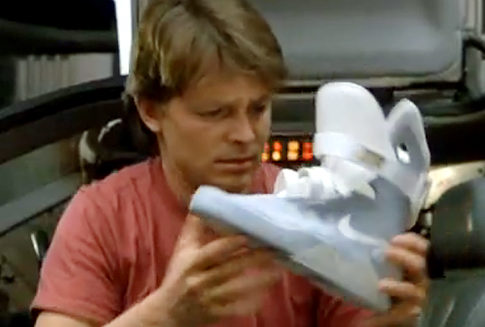
As of yesterday, every scene in the Back to the Future trilogy officially took place in the past, because yesterday — October 21, 2015 — is the date they go forward in time to in the second film: you remember, with the bad fashion choices, the self-lacing shoes, and the hoverboards? That’s the one. Fun times.
Well, not so fun for some people. Adam Clark Estes, over at Gizmodo, is a little ticked. In a piece rather directly titled “F**k Back to the Future Day,” he rages against the commercialization of this light, nerdy little day. Here’s a sample:
Back to the Future Day has ruined Back to the Future for me.”
I promised myself I would try to write this post without using any insults, but if you want to see a long string of them, just go look at the comment feed on Gizmodo’s Facebook post (you might need to dig, they’re very industrious over there, and far better at their jobs than I am). They can mostly be summed up with the words “killjoy” and “hipster,” which as a professional curmudgeon I don’t find quite insulting enough to consider insults. More like loaded descriptors.
So Clark Estes is upset at companies trying to capitalize on Back to the Future Day, and commenters are upset at him for being upset about the commercialization of the day. And I find myself asking why.
There’s this interesting phenomenon in pop culture today, whereby the things marketed to us as children seem to become tokens of our identity. We try to take possession of them, think of them as “our” culture. Just try telling a die-hard Star Wars fan the words “Greedo shot first” and you’ll get a quick lesson.
And maybe, for some references, it makes a little sense to be annoyed about commercialization. In twenty-five years if people are complaining about a remake of Firefly maybe I’ll be annoyed if it’s full of product-placement or whatever. But Back to the Future is not the place to be getting upset about this. Why?
Because Back to the Future, especially Back to the Future II, was one giant commercial dressed up as an entertaining film.
Why is Pepsi releasing “Pepsi Perfect?” Because they paid good money to have their brand appear in the film. Why is Nike making self-lacing shoes? Because they paid good money to have their brand appear in the film.

These were blockbusters. Yes, they were great stories, but they were also massive moneymaking ventures, and they succeeded in huge measure. So it’s completely, totally, 100% unsurprising to see that people are still trying to make money off it. Often in annoying, clumsy ways, but that’s what you have to deal with when you take a piece of pop culture and try to make it your identity.
Pop culture is fully mixed in with marketing and we don’t like it. We try to forget that Transformers was a cartoon designed to sell a line of toys, or that Walt Disney was one of the best salesmen on Earth. I mean hell: GI Joe much? But cultural products in this day and age are, almost by definition, both culture and products. And there lies the rub.
In a bizarre example of identity politics, we find ourselves taking something that was part-told, part-sold to us at a young age, remembering it with nostalgia-coloured glasses, and making it a part of who we are. Then something comes along that reminds us of the not-always pure relationship we had with our memories — an expensive bottle of Pepsi Perfect, say — and we get angry.
And that’s just the people mad about commercialization. Don’t get me started on the “authenticity” crowd, for whom the way they remember a shared cultural moment is-and-can-only-be the only way anyone remembers it.
So on the first day of the post-Future future, I’d like to take a moment to remind everyone: everything you ever bought was sold to you. But hey, at least it was sold to most of the people you knew, too. That’s how pop culture works.
***
Richard Ford Burley is a doctoral candidate in English at Boston College, where he’s writing about remix culture and the processes that generate texts in the Middle Ages and on the internet. In his spare time he writes about science, skepticism, and feminism (and pop-culture commercialization) here at This Week In Tomorrow.
